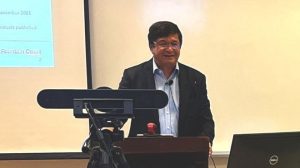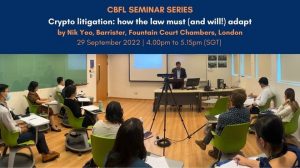Media - News
- Media
- CBFL Seminar Series: Crypto litigation: how the law must (and will!) adapt by Nik Yeo
CBFL Seminar Series: Crypto litigation: how the law must (and will!) adapt by Nik Yeo

On 29 August 2022, the Centre for Banking & Finance Law (CBFL) at the Faculty of Law, National University of Singapore, welcomed Nik Yeo, an esteemed commercial barrister with a strong practice in financial sector matters and a leading expert in litigation and arbitration, to give a seminar titled, ‘Crypto litigation: how the law must (and will!) adapt’. The seminar was held both in-person and over Zoom, and attended by over 40 participants consisting of academics, practitioners and students. Associate Professor Dora Neo, Director of CBFL, welcomed the participants and introduced the speaker. The seminar aimed to shed some of the most challenging questions faced by courts when dealing with disputes involving cryptocurrencies and smart contracts.
The advent and rise of cryptocurrencies have been transforming the global financial industry since the first emergence of Bitcoin. Despite having an enormous potential to disruptive traditional finance, cryptocurrencies also offer new and exciting opportunities to rethink the provision of financial services in an efficient and decentralized manner on a global scale. Cryptocurrencies are also foundational technology to facilitate smart contracts on DLT infrastructures. While paving the way for a new area of economic relationships between private parties (e.g., contracting), these technological developments challenge traditional legal concepts relating to the common law of contracts, fiduciary duty, property and possession. Indeed, the first private litigation cases involving cryptocurrencies have fueled intense debate among academics, professionals, and policymakers alike on their impact on applicable law.
As a first legal issue, Mr Yeo discussed some difficulties in applying common law causes of action, which depend on subjective mental elements (such as ‘knowledge’ and ‘reliance’), to smart legal contracting. Using the landmark case Quoine v B2C2, a decision of the Singapore Court of Appeal involving the formation of binding contracts between parties on a trading platform, he examined how the traditional common law doctrine of ‘unilateral mistake’ can (not) operate in algorithmic-executed legally binding agreements without human involvement. Notably, under this doctrine, the mistaken party may seek judicial remedy to lawfully void a contract if she can prove that the other, non-mistaken party knew or ought to have known of the mistake and also had an intention to take advantage of such a mistake. The court held that agreements made through electronic contract formation systems (i.e. exchange platforms), using pre-programmed and verifiable parameters, have legally binding contractual effects. In addition, as an effect, these contracts involve more than one contractual relationship (i.e. not only between traders but also between each trader and the platform). In considering the application of the unilateral mistake doctrine, the court set a high threshold for the requirement of “knowledge”. The test requires ascertaining whether the algorithm’s programmer had actual or constructive knowledge that algorithmic-concluded contracts would be accepted only by a party who was in mistake and whether the programmer intended to take advantage of that mistake already at the point of programming up to the point of the contract formation.
The presentation then shifted focus on issues relating to common law duties of care in the context of fiduciary relations when considering the role of algorithms’ developers vis-à-vis crypto owners. By reference to the English High Court case of Tulip Trading Limited v Bitcoin Association, which involved a claim concerning an alleged hack leading to a misappropriation of the private key of the claimant’s bitcoin account, Mr Yeo discussed the legal uncertainty around the imposition of a duty of care in tort or fiduciary duty on the developers towards the claimant to remedy the loss of account access through the writing of a software update. While these issues remain unsettled, it appears that a general duty of care cannot be derived as, inter alia, developers constitute a fluctuating group of individuals and, thus, cannot be held continuously responsible for the network. In addition, although enjoying a position of power in the network, the potentially open-ended nature of such a duty would de facto translate into developers being liable toward an unknown and potentially unlimited number of individuals. And this would arguably lead to a stretch of the law in unfair, unjust and unreasonable ways.
Next, Mr Yeo explored fundamental issues relating to the legal nature of crypto-assets as an object of proprietary rights. Jurisdictions worldwide generally strive to recognize crypto-tokens within established legal categories of property (e.g., tangible or intangible assets). Indeed, certain digital assets can hardly be conceived as belonging to common law’s traditional categories of personal properties (i.e. ‘things in possession’ and ‘things in action’). For instance, determining ‘possession’ raises a number of legal and conceptual difficulties arising, for example, from the often decentralized nature of certain crypto-tokens. Although one could argue that owners can possess the private key to access their crypto accounts, this piece of information does not per se suffice to ensure possession of a given crypto-token. Indeed, private keys as ‘data’ should rather be conceived as a separate ‘object’ that allows access to and avail of the underlying crypto-token. In light of these difficulties, thus, new approaches are emerging to provide legal certainty. As a striking example, Mr Yeo introduced the audience to the findings of the UK ‘Law Commission’s Digital Assets: Consultation Paper’, which contains proposals to reform the law relating to digital assets by recognizing certain crypto-tokens as a distinct, third category of personal property. This novel approach indeed represents an interesting legal development to provide legal clarity, thus ensuring the protection of legal rights in the emerging crypto economy.
Mr Yeo’s presentation was followed by a lively discussion among the participants. Highly interesting questions were arisen, including the following: what the role of courts ought to be in fostering legal reform about highly technical matters such as those relating to cryptocurrencies, smart-contract and underlying technology (i.e. DLT and blockchain); whether regulation should be seen as the best means to achieve further legal certainty; and whether legal concepts of ‘control’, as opposed to ‘possession’, could best help courts and policymakers to address issues of property.
Event website can be found here.


